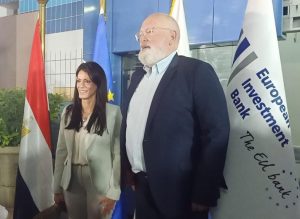Frans Timmermans, executive vice-president of the European Commission, has visited the Maspero metro station site, part of Cairo Metro Line 3 – Phase 3 project, for which the European Investment Bank (EIB) has provided financing worth €600 million ($680 million).
Egypt’s Minister of International Cooperation Rania al-Mashat, has accompanied Timmermans during his visit.
The project includes supervision and technical assistance funded by the EU grant component, which covers training and transferring expertise to the Egyptian National Authority for Tunnels (NAT). The French Development Agency’s (AFD) contribution amounts to €300 million, while the EU grant amounts to €43 million, according to the EIB’s statement released on Monday.
According to Timmermans, who is heading the Commission’s work on the European Green Deal, “The future can only be green. Through cooperation between Egypt and the EU team, we will achieve a more sustainable and prosperous future for Egyptians and Europeans alike.”

Minister al-Mashat emphasised the profound role that transport plays in driving Egypt’s inclusive economic growth. She said the transport sector is at the top of the Egyptian government’s national priorities, contributing to economic and social development, and enhancing people’s livelihoods.
The transport sector contributes 4.6 percent of Egypt’s gross domestic product, providing 6.2 percent of the job opportunities in the market, and it accounts for more than 20 percent of the International Cooperation Ministry’s ongoing development cooperation portfolio, with a value of $5.13 billion, she added.
The Egyptian minister applauded the strategic partnership with the European Union, which supports national efforts to achieve development across different sectors.
Cairo is home to about 20 million people and is the largest city in Africa. With climate change, a serious concern for Cairo and for Egyptians, improving the capital’s transport system will contribute to more sustainable and green economic growth and urban development in Egypt.
Metro Line 3 aims to lower travel times for residents, reduce traffic congestion, and cut carbon emissions and other pollutants in Cairo. It targets reduction of 9.3 megatonnes of CO2 emissions during the operating period.
The first 4.3 km-long phase of Line 3 was commissioned in February 2012 and the second 7.7 km-long phase started in May 2014. Phase 3 expands Line 3 westwards. It is set to connect the city centre, Abassia, to the west bank of the Nile, Giza, crossing the river via Zamalek Island before splitting into two branches. The first branch will head towards the Rod El Farag corridor in the north, while the other will head towards Cairo University in the south.
Line 3’s Maspero station is part of the first section (3a) of phase 3. This section comprises four underground stations. Maspero metro station is the last underground station before the line crosses the Nile. Phase 3 involves three sections, covering 15 stations in total.


